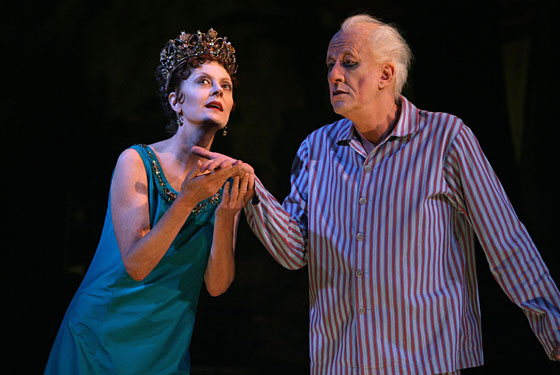
In Irena’s Vow, Tovah Feldshuh, playing a Catholic Pole who shelters a dozen Jews from Nazi persecution during World War II, is both insufferable and riveting. Her skills may be more in line with motivational speaking than they are with acting: She believes so wholeheartedly in what she’s doing that her conviction becomes the star of the show. You don’t have to love her; you may want to pelt her with tomatoes. But you can’t turn away from her.
Written by Dan Gordon and directed by Michael Parva, he play is based on the true story of Irena Gut Opdyke, who first suffered at the hands of Russian soldiers (she was beaten and raped by them) and later, after being captured by the Germans, became housekeeper to a high-ranking SS officer (here played by Thomas Ryan) in Nazi-occupied Poland. Upon realizing that the Jewish servants in the household are soon to be rounded up and shipped off for extermination, Irena hatches a plan so wild no fiction writer could have made it up: She decides to hide her friends—they’re represented by three characters, played by Maja C. Wampuszyc, Gene Silvers and Tracee Chimo—in the cellar of her master’s villa. They even help out, preparing vegetables and washing dishes, when he entertains his Nazi cronies.
The story is sometimes suspenseful and sometimes moving, as when Irena dissuades her friends from making a choice that plays into despair rather than defying it. Mostly, though, it’s ploddingly earnest. Irena’s Vow works best when it’s funny. At one point Irena marvels that she’s saved her friends from certain detection by distracting a Nazi creep with nothing more than a tray laden with schnapps and strudel. Although the character she’s playing is Catholic, Feldshuh plays the moment with a Borscht Belt flourish, proving Irena has one formidable weapon the Nazis don’t: a sense of humor.
Neil Armfield’s production of Eugene Ionesco’s Exit the King has such a sharply attuned cast; what a pity about the play. In this 1962 absurdist comedy, Geoffrey Rush plays King Berenger, a 400-year-old pajama-clad monarch facing the last hours of his life, an existence marked by hubris, incompetence, and whopping mistakes. His first wife, the intimidating Queen Marguerite (Susan Sarandon), wants him to acknowledge his empire is a goner and just die with dignity already. His second wife, softhearted sexpot Queen Marie (Lauren Ambrose) is more reluctant to let him go—but largely because her own self-worth depends on seeing herself reflected in his eyes.
Exit the King explores the tenacity with which we poor, miserable human beings cling to life. Ionesco’s conclusion, after two acts’ worth of wordplay and slapstick, with numerous expository philosophical ramblings tucked in among the somersaults, is that we’re powerless and we’d better get used to it. At best, that’s old news; at worst, it’s tiresome, condescending finger-wagging. But even when the material groans under its alleged weightiness, Rush—who, with Armfield, translated this version—keeps pumping energy into it. His performance is muscular and subtle at once: His King Berenger can barely move a step forward without becoming entangled in his own robes, a marvelous physical metaphor for humankind’s tendency to trip itself up. Andrea Martin, as royal servant Juliette, helps keep the proceedings aloft as well, getting a kingdom’s worth of laughs out of the word stew.
Still, it’s a relief when Sarandon’s Queen Marguerite—speaking, we can presume, for God himself—finally coaxes the fading, addled king into the afterworld. The sultry raspiness of her voice turns Ionesco’s text, for a time at least, into a soothing, seductive storybook. That’s when we know the end is near; she’s not the only one counting the king’s remaining minutes.
Irena’s Vow
Walter Kerr Theater
Exit the King
Ethel Barrymore Theatre